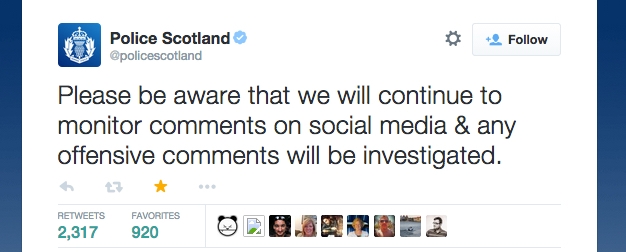Behold, the most offensive tweet I’ve seen in months. You don’t have to be an off-grid anarcho-libertarian freedom-squirrel to see there’s something distinctly unpleasant – even something dystopian – about this. But such, alas, is the temper of our times.
Times in which the state’s officers – for such is McPlod – believe they are entitled to monitor your every conversation, your every outburst, your every opinion for evidence that someone, somewhere in Scotland might be offended by your views. Nor is it too extreme to observe that this satisfies, in its essentials, the definition of a surveillance state.
Such idiocies are not, of course, confined to Scotland. The UK government appears convinced the country may soon be menaced by a plague of terrorist toddlers hellbent on their own hideous brand of jihad. Nor was the infamous – and still shameful – Twitter Joke Trial a matter pursued by the Scottish police. Nevertheless, don’t let anyone think the Scotch polis are going to allow anyone else to outdo them in their quest to be the nastiest, most chilling, pernicious police force in Great Britain.
Apparently, however, your ‘right’ not to be offended now trumps my actual right to be offensive. Any offensive [sic] comments will be investigated (except for those we tweet ourselves). Police Scotland are, in this instance, no better than ambulance-chasing defence lawyers. Have you been offended? Please say you have! We can help you!
This was no rogue tweet either and, for that matter, no laughing matter. The Crown Office’s guidelines on ‘cases involving communications sent via social media’ makes this entirely clear. The monitoring of so-called offensive communications extends to “the resending or for example ‘liking’ or ‘retweeting’, of communications originally posted by others”. Doubtless the authorities would say they do not routinely invoke these powers. That they have not is, however, plainly a matter of discretion and there’s no reason to suppose such draconian prosecutions might not happen in the future.
Notionally, there is “a high threshold test to be met” but when you look at it this threshold is so low a Dachshund could clear it. Thus, “In some instances the context in which the comments are made will weigh in favour of prosecutors being so satisfied, for instance where comments are made following a particular incident, national tragedy or catastrophic event.”
Hence the flurry of police activity in the aftermath of horrors such as the Clutha Vaults helicopter crash or the more recent bin-lorry tragedy in Glasgow. Morons post moronic comments on Twitter or Facebook or wherever and other morons report them to the police who in turn waste their time deciding whether a given tweet is grossly offensive or merely run-of-the-mill offensive.
But regardless of whether people are grossly offended by such posts or not it is plain that, in the absence of direct harassment or threats of specific harm, they’re simply expressions of opinion. Distasteful opinion, perhaps, but still only opinion. Which ought not to be enough to trigger an investigation, far less arrests and prosecutions. This is so even if – no, especially when – a reasonable person might conclude the tweets (or whatever) were racist, sectarian, homophobic or anything else. The freedom to be a moron is an important one. Ditto for bigots.
I would have more – which is to say, any – confidence in the police’s ability to recognise this if they did not have form on these matters. They are only too happy to arrest people for expressing their thoughts. It is not an exaggeration to say Thought Crime now exists in this country.
We know this, too, from the manner in which the police have conducted themselves in the matter of our old friend the Offensive Behaviour at Football Act. Primary responsibility for this illiberal, rotten, capricious, unjust, ludicrous piece of legislation lies with SNP MSPs but the police must take their share of the blame too.
I remind you that the law as written and enforced allows for the creation of entirely fictitious or imaginary people who might have been offended had they existed and had they been present to hear the alleged criminal offences (songs, chiefly) being committed. You may think I exaggerate. If only that were the case. To wit, the High Court has ruled that:
[T]he sheriff does not appear to have considered the effect of section 1(5). That subsection provides that for the purposes of section 1(1)(b)(ii), behaviour “would be likely to incite public disorder” if public disorder would be likely to occur but for the fact that […] persons likely to be incited to public disorder are not present or are not present in sufficient numbers.
Remember, too, that a Scottish government minister was forced to clarify whether singing the national anthem might be reckoned a sectarian offence under the terms of this fat-headed bill.
So, no, I don’t trust the police to exercise their powers with any sense of proportion and you shouldn’t trust them either. Moreover, when it comes to guarding the principles of free expression it is equally plain that the line must he held vigilantly lest the principle be conceded and we begin – as we have in fact done – to erode liberties once taken too blithely for granted.
But this, of course, is the Era of Hurt Feelings and thank god Mama Plod is on hand to make sure no-one bruises your emotions. No wonder we are becoming a nation of clypes. Not East Germany, no, but not something of which to be proud either.
Happy new Year.







Comments